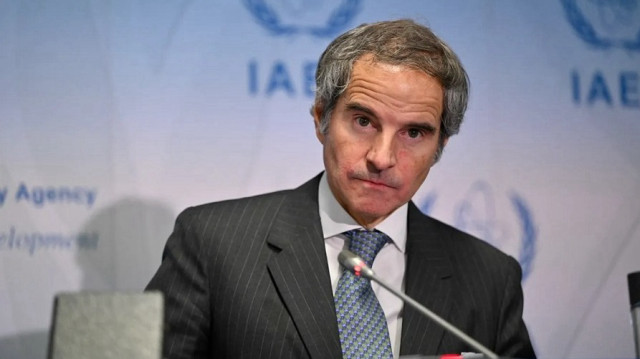
'When you accumulate and continue to accumulate…very, very close to what is needed for a nuclear explosive device, then we cannot ignore it,' says Rafael Grossi
The head of the UN's nuclear watchdog expressed grave concern Monday over the scale of Iran's uranium enrichment, warning that the country's current stockpile is edging dangerously close to the threshold needed for a nuclear weapon.
Speaking at a news conference following the opening of the Board of Governors meeting of the International Atomic Energy Agency (IAEA) in Vienna, IAEA Director General Rafael Grossi said the level of enrichment being carried out by Tehran “cannot be ignored.”
“Uranium enrichment per se is not a forbidden activity, which is something my Iranian counterparts always tell me,” Grossi said. “But when you accumulate and continue to accumulate…very, very close to what is needed for a nuclear explosive device, then we cannot ignore it.”
“There is no medical or civilian use for it. That is why it is important for us,” he added.
While enrichment is permitted under international law and Iran's commitments under the Non-Proliferation Treaty (NPT), Grossi made it clear that the degree and pace of Iran's enrichment program raises red flags from a safeguards perspective.
His remarks came amid renewed diplomatic tension over Iran's nuclear file. Iran and the US have engaged in five rounds of indirect talks since April, mediated by Oman, in a bid to find a path back to a nuclear agreement following the US's 2018 withdrawal from the 2015 Joint Comprehensive Plan of Action (JCPOA).
But a major obstacle remains: Iran's refusal to halt enrichment, which it insists is its sovereign right under the NPT.
Responding to questions about a potential referral of Iran's nuclear case to the UN Security Council and the reactivation of the “snapback” sanctions mechanism, Grossi said: “Well, I think everything is interconnected.”
He noted that while the IAEA remains a technical body, it supports diplomatic efforts between Tehran and Washington and continues its verification work independently.
Grossi also commented on Iran's claim that it had obtained documents related to Israel's nuclear program.
“This seems to refer to Soreq, which is a research facility which we inspect, by the way,” he said, noting that the agency has not received any official communication about the issue.
He said that while the IAEA monitors the Soreq site under a limited safeguards agreement with Israel, it does not have access to other parts of Israel's nuclear infrastructure, including the Dimona facility.
Addressing recent Israeli threats of a military strike against Iran's nuclear sites, Grossi emphasized the agency's role in promoting peaceful solutions.
“We are trying to solve this without the use of violence or force,” he said.
Iran has responded by warning that it would retaliate forcefully against any such attack, with officials vowing “a devastating response” to any Israeli military action.
While Grossi reiterated that the IAEA is not accusing Iran of developing nuclear weapons, he stressed that the current levels of enrichment demand international attention and verification.
“Because of the fact that we haven't received the answers we need, we cannot assure that everything is in peaceful uses,” he said.







